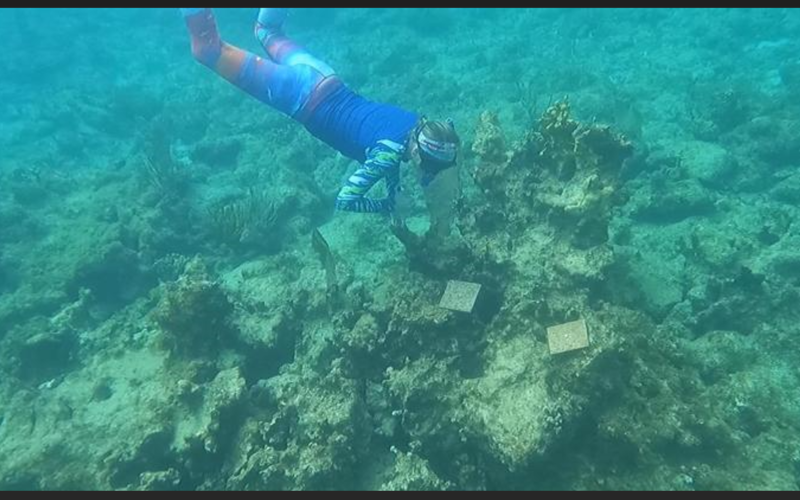CRUZ BAY — A seven-year study on St. John’s coral reefs has found troubling signs that conditions are worsening for sensitive marine species, including a microbe that is one of the most abundant oxygen-producing organisms on the planet.
“Coral reef ecosystems in the Caribbean are ghost towns of the habitats that they were 50 years ago,” according to the study published Thursday in Environmental Microbiology. Reefs in the U.S. Virgin Islands are one of the longest-studied regions in the Caribbean, and “are a natural laboratory to examine the impact of disturbance events on reefs.”
Researchers from the Woods Hole Oceanographic Institution in Massachusetts traveled to the territory and sampled water from eight reefs during the field work, which was conducted with support from the University of the Virgin Islands.
Several WHOI scientists on St. John were interviewed during a research trip in November 2022, including Amy Apprill, a microbial ecologist who explained how she filtered samples to collect the “incredibly abundant” organisms that inhabit reef water.
Only 20 drops of seawater contain 10 million microbes, and Apprill said DNA sequencing has shown that each reef habitat has its own microbial signatures.
“Within that, there’s so much more for us to learn,” Apprill said.
The results of the study were published Thursday by first author Cynthia Becker, Laura Weber, Joel Llopiz, T. Aran Mooney, and Apprill.
“Coral reefs have been declining for decades. Climate change, hurricanes, disease, and other stressors have played a major part in that,” according to a statement from Becker, a recent graduate of the MIT-WHOI Joint Program. “Reefs provide habitat for about 25% of all marine species, but they also support billions in tourism and fishing. It is important for us to monitor changes in coral reefs as they are happening and the microbes in their environment can really help us do that.”
Over the course of the study, hurricanes Irma and Maria struck the Virgin Islands in 2017, and an outbreak of stony coral tissue loss disease started in 2020.
During that time, ammonium concentration increased in the water, leading to a 34% decline in Prochlorococcus, a small photosynethic bacteria that produces oxygen and brings beneficial carbon into the coral ecosystem.
According to the study, “As disturbances impact reefs, the changing nutrient and microbial regimes may foster a type of microbialization, a process that hastens reef degradation.”
“Understanding the composition of a healthy reef microbial community is important. Without the balance of micro and macroorganismal health, you cannot have a healthy functioning ecosystem,” Becker said. “Another benefit to this advancement is for coral reef restoration efforts. The microorganisms can provide an assessment of the ecosystem health. This could complement visual assessments to determine if a reef’s health has been restored.”

